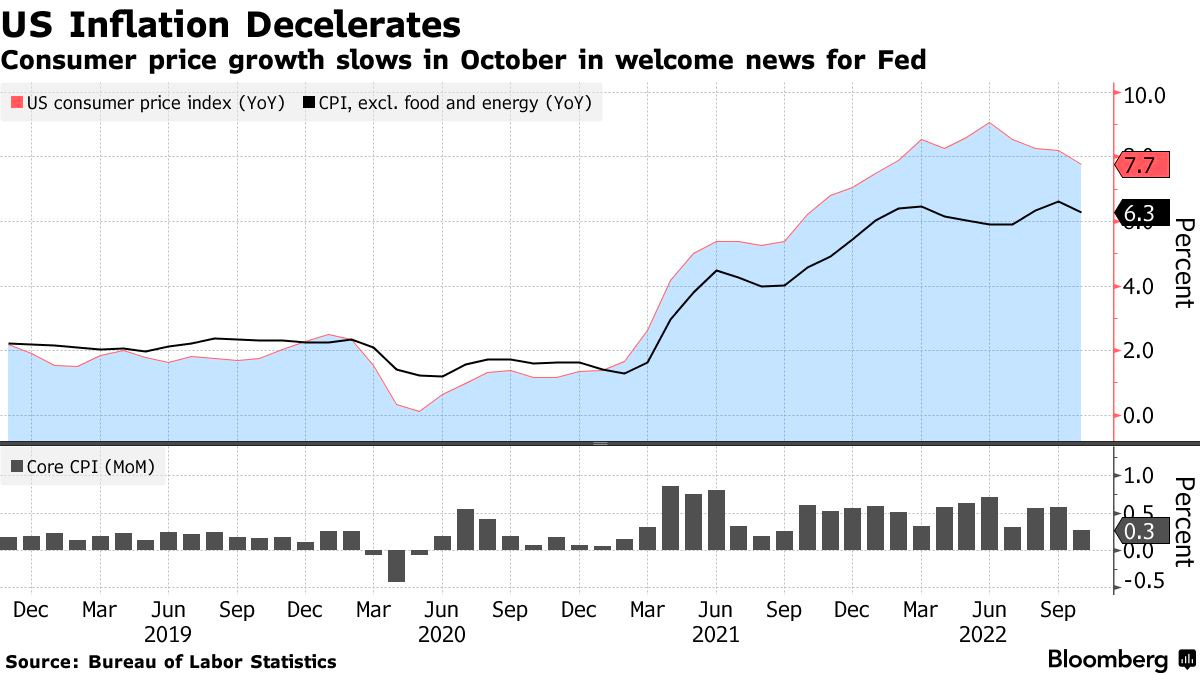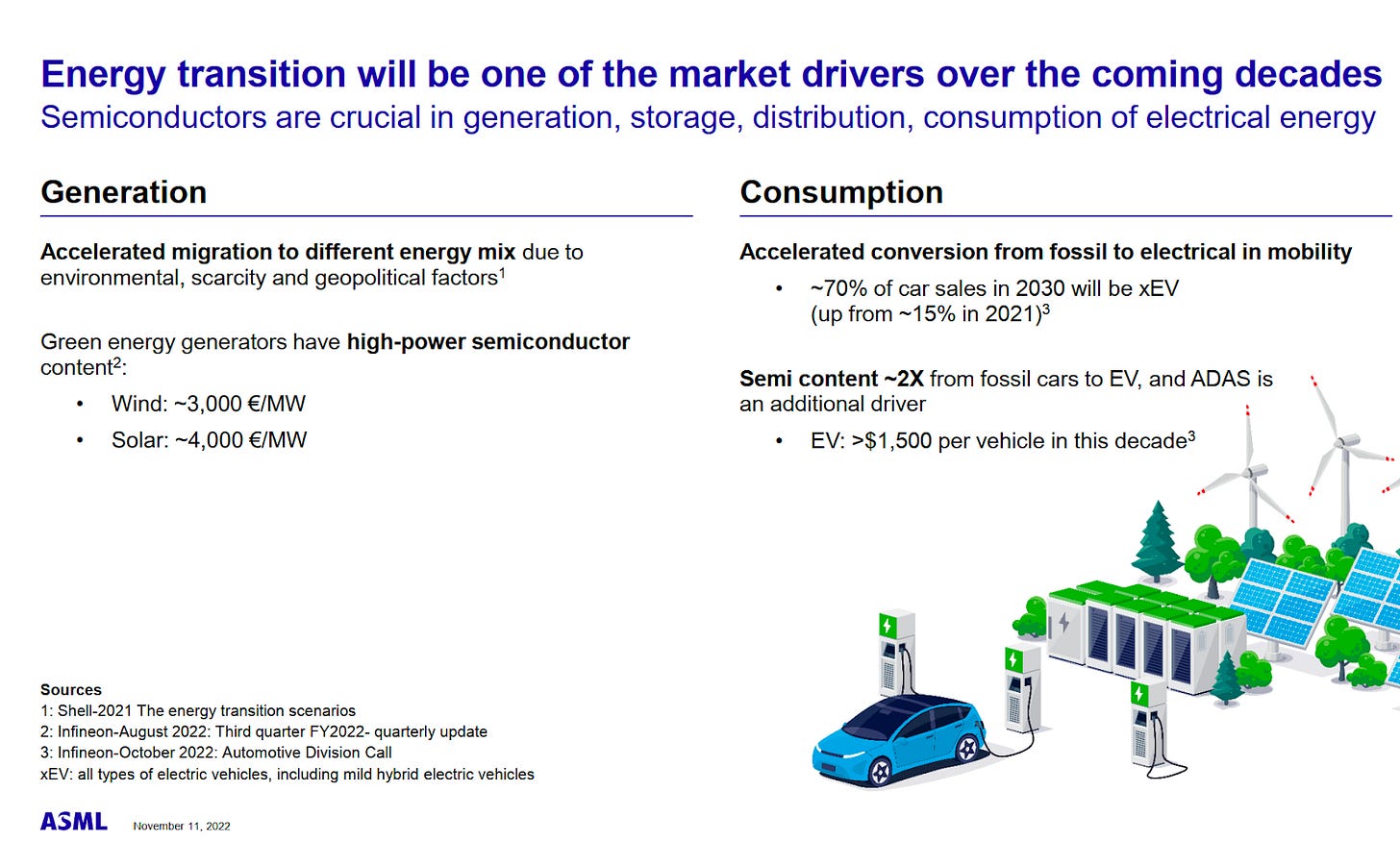In this episode, we discuss the signals from freight companies on weakening demand, the FTX saga, and the Meta U-turn.
The episode is based on yesterday's newsletter which is available on Substack.
A transcript of this podcast, with relevant images and quotes, is available for all subscribers after the show notes below. Our podcast is available on Apple Podcasts, Spotify, Google Podcasts, YouTube, and Amazon Music.
Show Notes
00:00:00 Introduction
00:00:07 Inflation Going Down?
00:03:09 The Crypto Crisis
00:07:54 The Meta U-Turn
00:09:36 Semis and the Energy Transition
00:10:06 Conclusion
Transcript
Introduction
[00:00:00] Scott: Welcome everyone to a new episode of The Transcript podcast. You've got me, Scott Krisiloff, I'm editor of The Transcript, along with Erick Mokaya, who's our lead author.
Inflation Going Down?
We sent out a new issue of the newsletter yesterday and what we noticed last week was that there are some signs that inflation is actually starting to cool. At the headline, I think everyone noticed the CPI number, which was better than people had expected, but we also picked up a number of quotes throughout the newsletter last week that showed that supply chains were getting better, that demand is starting to weaken, that labor markets are less tight, promotional pricing because of high inventories. And so there were a number of things that we looked at and saw that suggested that inflation is cooling, and by extension, maybe the economy is cooling which may be its own - - who knows if that's a positive or a negative for capital markets. Erick, any thoughts along those lines?
[00:00:52] Mokaya: I think I agree. The pop in terms of the stock markets that day when inflation was slightly lower, I think by, is it 0.5%? It came in lower than expected. So I think the pop just tells you that there's an eagerness in the market for people to see inflation coming down. And I think the two key takeaways for me would be from the macro section, are the two quotes from the freight companies. FedEx was talking about they've reduced freight frequencies and then they are actually parking the aircraft this holiday. So coming into this year, FedEx and a lot of other companies have budgeted that and I think it's a bit of a trend across a lot of companies that budgeted that the eCommerce boost from the pandemic would be sustained to this year. But it seems like people are a bit afraid maybe of inflation and a bit afraid of how the economy is going are cutting back on spending, especially on some items. So you're finding FedEx, JB Hunt, they're talking about there's no significant surge in demand. In fact, the specific quote from the JB Hunt exec is that this is the most muted peak season that he has seen. So I think the effect all this would have, especially this being retail week, is that we may see especially elevated inventories and also especially maybe a bit of a slow down in terms of economic spending, certain pockets of the markets, not travel, not entertainment surprisingly. People want to be entertained, but at least there are other pockets of the market, especially the good section, there’s still quite a bit of demand cooling down. Any other takeaway for you?
"So besides reducing the flight frequencies, we'll be parking aircraft temporarily as we don't need as much lift as we anticipated going into the year…At this point, it's fair to say we've got a little more capacity than was anticipated, given the demand we're seeing -- as I said, we're projecting a lower demand outlook for the foreseeable future here." - FedEx (FDX 0.00%↑) CFO Michael Lenz
"2022 is, I would call it, the most muted version of peak season that I can recall in my career. We just don't have a significant surge in demand- J B Hunt Transport Services (JBHT 0.00%↑) EVP & President of Intermodal Darren Field
[00:02:19] Scott: Yeah, I think it's still not open and shut that demand is coming down. I think that this could still be the echoes that we had seen in other places in terms of, to your point goods demand cooling, but service demand's still running strong. And we have been profiling for a long time the high inventories that retailers are carrying and potentially promotional pricing that they're going to be taking. But maybe it's really just that capital markets may have gotten exhausted by the amount of selling pressure that had been taking place in 2022. And starting to feel fatigued about that and just looking for a light at the end of the tunnel for inflation. And so with the CPI numbers coming in slightly better than expected, just a little bit of an opportunity for a relief rally on this.
The Crypto Crisis
[00:03:09] Mokaya: Yeah hopefully the capital markets open up. But speaking of capital markets, this week is also a bit of crypto. What do you call it? Like a crypto crisis week? I don't know what's your takeaway from that. Because FTX, one of the key exchanges in crypto went down this week and it seems to have been built on a house of cards. So I think the repercussions of that is that the head of FTX was very key in terms of trying to engineer a bit of regulation, not a bit of, he was in Washington a lot, so I don't know, like doing this advocating for crypto to actually be taken more seriously in the markets. And then this particular hit they got this week may mean that a lot of the progress crypto has made in terms of headway in Washington may take a while to come. So I think that's some of the things that I'm noticing in the market. A lot of bad actors are being found out this week. I think I like the quote from the Airbnb CEO who tweeted something like, “It feels like we are in a night club and then the lights just got turned on”. What's your take on crypto this week and the assessment of the - - I've never actually had you speak about crypto before, so you can also give us your thoughts on crypto.
"There's going to be regulatory headaches galore. I'd say Sam Bankman-Fried spent more time than anyone in Washington so regulators will take a new look at this. And so that's frustrating. Confidence in institutions, and so I'm not trying to be pollyannaish. This makes the operating environment more challenging for the next period. But I want to emphasize I have not lost any of my medium and long-term belief that this space is inevitable -- What's painful about this is that Sam spent so much time in D.C., And it wasn't that what he said was crazy. It's just that the messenger now looks like he ran his ship into an iceberg. We'll see why that happened. It's just going to anger the people he spent time with, and I think it will slow them down some." - Galaxy Digital ($BRPHF) CEO Michael Novogratz
[00:04:15] Scott: Yeah, I think I'd probably follow a little closer on the Jamie Dimon spectrum when it comes to crypto in terms of the underlying asset value itself. So I think there was always gonna be this tension between crypto and the current regulatory regime because cryptocurrencies tend to just call the things that we already know how to use in terms of currency or securities. They just kinda call 'em by different names and then pretend like they don't have to play by the same rules as everybody else does in capital markets. And I think, regulations slow people down. When you ignore a regulatory regime because you're calling the same instrument, a different name, then you can move faster than the regulated entities. But the way that regulatory response ends up working frequently is that you do something for several years that was counter to what the regulations say, and then the regulators tend to come back around. So I think it'll be interesting to see what the regulatory response to this is. If retail investors get hurt as clients of FTX or other crypto brokerages, I would assume that Washington will come down pretty hard on them. But the one thing that I really think that the crypto community has done really is actually convince the Washington establishment, or at least some factions of the Washington establishment, that crypto is the future and something can be supported, even though it's a direct threat to one of the most important sources of power of the US Federal government, which is the currency.
[00:05:45] Mokaya: The funny thing though was that when you look at what was happening in terms of unfolding terms of the crisis, everyone was looking out for who can bail out this FTX and this Binance was having an issue. Who can bail out FTX. So it reminds you about the 2008 crisis where someone is actually asking, Okay, who's going to bail out these banks? Okay, we turn to the Fed, but then in crypto land they can only turn to the competitors who are Binance or you die and then that's all. So I think it's just been a funny weekend looking at crypto realize that finally maybe we actually do need a federal reserve of crypto or something like that.
[00:06:20] Scott: Yeah. I think the system of crypto itself is supposed to exist without essential regulatory authority, right? It's the algorithm is the central bank, basically. And so you don't have the ability to prevent the bank run other than the turn of the 20th-century tools like having very powerful organizations within the fabric of the community that can come and come to the aid of a bank run. But then, I think the other element of crypto that probably the diehard enthusiasts are thinking right now is that really the value of crypto is you're supposed to be able to actually possess it yourself. You don't actually have to deposit it at a financial institution. So this poses a risk to the central institutions. But if you're holding the crypto yourself in your wallet, then there's no bank run you can have on your own wallet. It can be stolen, but you can't have a bank run on it. Maybe this leads to even more decentralization. I do think on a bullish note for crypto, one of the most surprising things to me is that the price of Bitcoin and Ethereum, they've fallen, but, they're still holding in pretty well in traditional capital markets, if you were to see a large broker dealer fail like we saw with Lehman and like we saw with Bear Stearns as they're liquidating their asset portfolios, this creates significant selling pressure on markets. So I would assume that FTX on winding would create a lot of selling pressure among crypto markets generally, and at least the indicators that I look at in terms of Bitcoin and Ethereum, they're not seeing that much price with selling pressure. So that's pretty impressive.
The Meta U-Turn
[00:07:54] Mokaya: It is very impressive. Away from crypto and maybe on Meta, Meta laid off employees this past week, 13%. They've been pretty reluctant to do that. Pretty reluctant to make any moves in terms of changes in CapEx and OpEx, but then they came out one week with a letter laying off 13% and again, cutting OpEx and CapEx spend. Still spending on Reality Labs. Any quick take on that? What's your thought on that? People are underestimating the company just as the CEO was saying that maybe people are estimating us, they're not looking at our core business is actually doing pretty well.


[00:08:27] Scott: Yeah, I think that my takeaway from this Meta announcement is really a lesson on how it is difficult to bet against companies. People come to work every day in order to build value, not destroy value at most companies. So well-run companies if, you know there's something not going their way or in the right direction, a well-run company will actually shift direction and try to adapt to the new environment. And so I do think that the last earnings call was a very negative moment for Meta. And this large announcement of layoffs must be in response to criticism that the company received about the amount that it's investing. And so this actually most importantly, I think is a signal that the company is taking that feedback into account and changing directions. These are the types of things that can create longer-term buying opportunities for a company like Meta if you believe that the core business is still intact.
[00:09:25] Mokaya: I believe that strongly. I can see like the core business is strong. I think people have been a bit skeptical, especially about the Reality Labs and the metaverse and there are quotes about the metaverse also being very tight right there.
Semiconductors and the Energy Transition
..if all the electricity is wind and solar, massive amounts of semiconductors are needed. Now, of course, there will be a mix. But it just shows you that we haven’t thought of things, particularly in the area of what we call mature or mainstream or speciality semiconductors. It’s in power, power ICs, in analog, it’s microcontrollers, it’s sensors, optical sensors, non-optical sensors." - ASML (ASML 0.00%↑) CEO Peter Wennink
Maybe a final comment was about the quote that I saw about semiconductors being very important to the future of the energy transition. That's something I haven't caught on for myself and I think ASML CEO also acknowledged that they're just learning themselves how the energy transition will actually involve heavy use of semiconductors, which is a new use case which is a bit of a bullish case for semiconductors as an industry which is also pretty challenged this year, given the oversupply in certain pockets of the market. That's what I would take. Any other takeaway or should we end there for this week?
Conclusion
[00:10:06] Scott: I think that's a good place to stop for this week.
[00:10:08] Mokaya: All right, thank you. We're watching retail companies this week as they report. Follow us on Twitter, and obviously, subscribe to the newsletter where we will give you a quick recap on what happened with retail companies this week. See you next week and have a good week ahead.





















Share this post